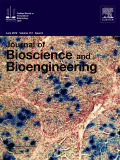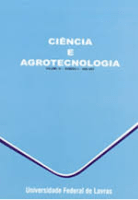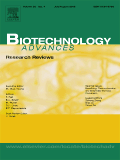
BIOSYSTEMS ENGINEERING
Scope & Guideline
Elevating knowledge in the fields of food and soil science.
Introduction
Aims and Scopes
- Bioprocess Engineering:
Research on optimizing and scaling up bioprocesses for the production of biofuels, bioplastics, and biochemicals. This includes studies on fermentation technologies, enzyme applications, and the use of microbial systems for efficient production. - Nanobiotechnology:
Exploration of the synthesis and application of nanoparticles in various fields, including biomedical applications, environmental remediation, and agricultural enhancements. This area emphasizes green synthesis methods and the characterization of nanomaterials. - Environmental Biotechnology:
Investigations into the use of biological systems for wastewater treatment, bioremediation of pollutants, and sustainable practices in waste management. This includes studies on microbial communities, biofilms, and innovative reactor designs. - Microbial Metabolism and Engineering:
Research focusing on metabolic engineering of microorganisms to enhance the production of valuable compounds, including amino acids, organic acids, and bioactive metabolites. This area covers genetic modifications and pathway optimization. - Plant and Algal Biotechnology:
Studies on the utilization of plants and algae for bioproducts, including biofuels, bioplastics, and nutraceuticals. This encompasses investigations into cultivation techniques, extraction methods, and the biochemical properties of plant and algal systems.
Trending and Emerging
- Sustainable Production Processes:
There is a noticeable increase in research focused on sustainable practices, including the valorization of waste materials and the development of eco-friendly bioprocesses. This trend aligns with global efforts to enhance sustainability in biotechnological applications. - Synthetic Biology and Genetic Engineering:
Research in synthetic biology and genetic engineering is rapidly expanding, with a focus on designing microorganisms with enhanced metabolic capabilities for the production of high-value biochemicals and pharmaceuticals. - Microbial Fuel Cells and Bioenergy:
The study of microbial fuel cells (MFCs) and their applications in bioenergy generation is growing. This includes research on optimizing MFC systems for efficient energy recovery and wastewater treatment, highlighting the dual benefits of these technologies. - Biomaterials and Biocomposites:
There is an emerging interest in the development of biopolymers and biocomposites for various applications, including packaging and medical uses. Research is focusing on the properties, production methods, and applications of these sustainable materials. - In Situ Monitoring and Automation in Bioprocesses:
Recent publications indicate a trend towards the integration of automation and real-time monitoring technologies in bioprocesses. This aims to enhance control, efficiency, and scalability in biotechnological applications.
Declining or Waning
- Traditional Fermentation Processes:
Research focusing on conventional fermentation methods has seen a decline as newer, more efficient techniques and microbial strains are being developed. The focus is shifting towards more innovative approaches, such as co-culturing and engineered strains. - Chemical Synthesis of Bioproducts:
The interest in purely chemical synthesis methods for bioproducts is waning as the emphasis moves towards enzymatic and biocatalytic processes that are considered more sustainable and environmentally friendly. - Single Microbial Systems:
Research that solely investigates the use of single microbial species in bioprocesses has decreased. There is a growing trend towards understanding microbial consortia and their synergistic effects in biotechnological applications.
Similar Journals

Algal Research-Biomass Biofuels and Bioproducts
Pioneering research for a greener bioeconomy.Algal Research - Biomass Biofuels and Bioproducts is a prestigious academic journal published by Elsevier, dedicated to advancing the field of algal biotechnology and its applications in biomass, biofuels, and bioproducts. With an ISSN of 2211-9264 and a notable impact factor, this journal is recognized as a leading source of innovative research, boasting a current Scopus rank of #31 out of 406 in the domain of Agricultural and Biological Sciences, specifically Agronomy and Crop Science, positioning it in the top 8% of its field (92nd percentile). This open-access publication, established in 2012 and covering literature up to 2024, prioritizes disseminating high-quality research that fosters sustainable solutions for energy and bioproducts derived from algal resources. As a Q1 ranked journal in the 2023 Agronomy and Crop Science category, it serves as a vital resource for researchers, professionals, and students seeking to understand and leverage the potential of algae within the biodiverse framework of bioeconomy and sustainable practices.

JOURNAL OF BIOSCIENCE AND BIOENGINEERING
Empowering discoveries in biosciences for a better tomorrow.The JOURNAL OF BIOSCIENCE AND BIOENGINEERING, published by the SOC BIOSCIENCE BIOENGINEERING JAPAN, is an esteemed peer-reviewed journal dedicated to advancing knowledge in the fields of applied microbiology, biotechnology, and bioengineering. With its ISSN of 1389-1723 and E-ISSN 1347-4421, this journal has been providing a platform for innovative research since its inception in 1991, maintaining its relevance through periodic updates and a scope that encompasses various aspects of bioscience and engineering. The journal boasts a notable impact factor, reflecting its contributions to the Q2 and Q3 quartiles in relevant categories as of 2023, which positions it amongst the well-regarded publications in its field. Researchers and professionals can access its rich archive through open access options, ensuring wide dissemination of pivotal studies. With its address rooted in Osaka University, Japan, the journal serves as a vital resource for scientists and scholars committed to pushing the boundaries of biosciences and engineering.

Revista de la Facultad de Agronomia de la Universidad del Zulia
Advancing Agronomy: Bridging Research and PracticeWelcome to the Revista de la Facultad de Agronomia de la Universidad del Zulia, a key publication in the fields of Agronomy, Animal Science, Food Science, and Plant Science. Published by the Facultad de Agronomía, Universidad del Zulia, this journal aims to foster academic dialogue and disseminate impactful research that advances knowledge and practice within these disciplines. Operating under the ISSN 0378-7818 and E-ISSN 2477-9407, this journal offers a platform for both emerging and established scholars to share their discoveries and innovations. Despite its challenges, as reflected in its Q4 ranking across multiple categories in 2023, it remains a vital resource for the Venezuelan scientific community and beyond. Readers will benefit from a diverse array of studies and discussions that address contemporary issues in agriculture and related fields, helping inform best practices and policy. Engage with cutting-edge research from Venezuela and contribute to the development of agronomic sciences in the region.

PESQUISA AGROPECUARIA BRASILEIRA
Cultivating research excellence in Brazilian agriculture.PESQUISA AGROPECUARIA BRASILEIRA, an esteemed journal published by EMPRESA BRASIL PESQ AGROPEC, serves as a vital platform for disseminating research in the realms of agronomy, animal science, horticulture, and soil science. With an ISSN of 0100-204X and an e-ISSN of 1678-3921, this Open Access journal has been at the forefront of agricultural research since its initiation in 1978, and has been fully accessible to researchers globally since 1999. Hailing from Brazil, it is dedicated to advancing knowledge in agricultural practices and sustainability, making it an essential resource for academics and professionals alike. The journal is ranked in the Q3 and Q4 quartiles across various categories, reflecting its impact within the scientific community, while its Scopus rankings illustrate its commitment to high-quality scholarship. With its rigorous peer-review process, PESQUISA AGROPECUARIA BRASILEIRA not only promotes scholarly engagement but also plays a crucial role in addressing agricultural challenges, thus appealing to a broad audience of researchers, professionals, and students seeking to contribute to this dynamic field.

Chemical and Biological Technologies in Agriculture
Leading the Charge in Agricultural Technology AdvancementsChemical and Biological Technologies in Agriculture is a premier open-access journal published by SPRINGER, dedicated to advancing research in the fields of agronomy, crop science, biochemistry, biotechnology, and food science. Established in 2014, this journal has quickly gained recognition, boasting impressive rankings with Q1 status in Agronomy, Crop Science, Biotechnology, and Food Science categories as of 2023, underscoring its significance in fueling innovations in agricultural technology. With an E-ISSN of 2196-5641, it provides a platform for researchers and practitioners to disseminate impactful findings and methodologies that address key challenges in sustainable agricultural practices. By facilitating open access to contemporary research, the journal aims to foster collaboration and knowledge exchange among multidisciplinary stakeholders in the agricultural sector. With a commitment to excellence reflected in its Scopus rankings, notably #57 in Agronomy and Crop Science, it serves as an invaluable resource for professionals, researchers, and students striving for breakthroughs in chemical and biological technologies. The journal remains at the forefront of addressing global food security and environmental sustainability through rigorous scientific inquiry.

ELECTRONIC JOURNAL OF BIOTECHNOLOGY
Empowering Global Collaboration in Biotechnology ResearchThe Electronic Journal of Biotechnology is a premier Open Access journal published by Pontificia Universidad Catolica de Valparaiso, Chile, dedicated to advancing the fields of applied microbiology and biotechnology. With its inception in 1998 and an unwavering commitment to sharing knowledge, the journal has garnered a respectable ranking within the Q3 quartile for both its biotechnology and applied microbiology categories as of 2023, reflecting its significance in the academic community. Researchers and professionals will find its editorial rigor complemented by a robust platform for disseminating innovative findings, fostering collaboration, and driving forward biotechnology discussions. Given its inclusive approach, having transitioned to Open Access in 2014, the journal ensures that research is accessible to a global audience, making it a valuable resource for students, academics, and industry practitioners alike. Through the publication of original research, reviews, and critical insights, the Electronic Journal of Biotechnology aims to bridge the gap between scientific discovery and practical application, ultimately contributing to advancements in health, agriculture, and environmental sustainability.

BIOTECHNOLOGY LETTERS
Exploring the Cutting Edge of Biotechnological AdvancementsBIOTECHNOLOGY LETTERS is a prestigious peer-reviewed journal that has been at the forefront of biotechnology research since its inception in 1979. Published by Springer, this esteemed journal serves as a vital platform for disseminating cutting-edge research in the fields of applied microbiology, bioengineering, and biotechnology, with a focus on innovative methodologies and technologies. With an impact factor reflecting its critical contribution to the discipline, BIOTECHNOLOGY LETTERS resides in the Q2 and Q3 tiers of various scientific categories, placing it among the notable journals in the biotechnological landscape. Although it offers traditional access options and does not feature open access, the journal embraces a global readership, encouraging submissions from researchers, professionals, and students eager to explore the dynamic advancements in biotechnology. Situated in the Netherlands, it continues to shape the future of the field through relevant, impactful research that addresses contemporary challenges and opportunities in medicine and beyond.

CIENCIA E AGROTECNOLOGIA
Fostering Knowledge Exchange in Agronomy and BeyondCIENCIA E AGROTECNOLOGIA, published by UNIV FEDERAL LAVRAS-UFLA, is a vital open-access journal since 2005 that serves as an influential platform for disseminating research in the fields of Agronomy, Animal Science, Food Science, Soil Science, and Veterinary Science. With its ISSN 1413-7054 and E-ISSN 1981-1829, this journal is recognized for its contribution to science and technology advancements in agriculture, particularly in Brazil, fostering knowledge exchange among researchers, professionals, and students. Currently ranked in the Q2 quartile for Agronomy and Crop Science, Animal Science and Zoology, and in the Q3 quartile for Food Science and Soil Science, it demonstrates a solid international standing in the relevant Scopus indices. The journal's commitment to open access ensures that critical research findings are freely available, enabling a broader impact and encouraging collaborative advancements in agritech. As the journal looks towards its converged years from 2007 to 2024, it continues to uphold its objectives of promoting sustainable practices and innovation within the agricultural sciences.

BIOTECHNOLOGY ADVANCES
Exploring Tomorrow's Biotechnological BreakthroughsBIOTECHNOLOGY ADVANCES is a premier, peer-reviewed journal published by PERGAMON-ELSEVIER SCIENCE LTD, dedicated to advancing knowledge in the rapidly evolving fields of biotechnology and bioengineering. With an ISSN of 0734-9750 and an E-ISSN of 1873-1899, this esteemed journal covers a wide spectrum of topics relevant to applied microbiology, molecular biology, and biochemical innovation. Recognized for its academic rigor, it holds a distinguished position in the top quartile (Q1) in multiple categories, including Applied Microbiology and Biotechnology, Bioengineering, and Biotechnology, further evidenced by its high rankings in Scopus, where it ranks #3/127 in Applied Microbiology and Biotechnology and #7/311 in Biotechnology. Researchers and professionals in the field value the journal not only for its comprehensive coverage of cutting-edge research but also for its commitment to disseminating critical findings and fostering collaboration. While BIOTECHNOLOGY ADVANCES currently operates under a subscription model, its potential impact on future innovations in biotechnology cannot be overstated, making it an essential resource for anyone interested in the forefront of biotechnological advancements.

Microbial Cell Factories
Innovating Tomorrow's Biotechnology with Microbial Cell FactoriesMicrobial Cell Factories is a premier peer-reviewed journal dedicated to the field of applied microbiology and biotechnology, published by BMC in the United Kingdom since 2002. With an impressive impact factor, this journal has consistently ranked within the Q1 category across multiple disciplines, including Applied Microbiology, Bioengineering, and Biotechnology, showcasing its significance in the scientific community. The journal’s commitment to open access ensures that innovative research is freely available to researchers, professionals, and students worldwide, fostering collaboration and knowledge dissemination. With a strong presence in Scopus rankings, Microbial Cell Factories is recognized for its contributions to advancing the understanding and application of microbial processes in production systems, making it an essential resource for those involved in the microbiological and biotechnological fields.